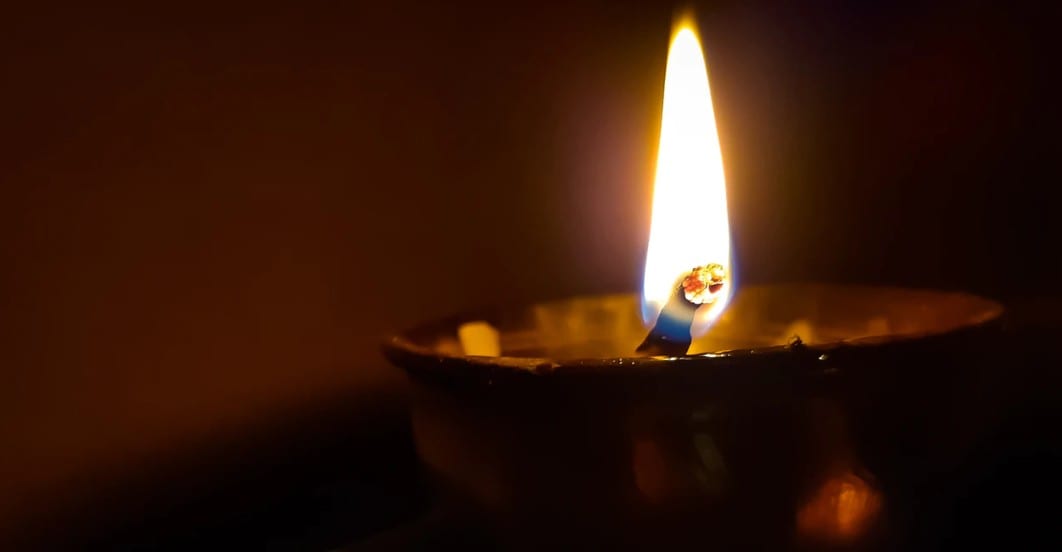Out Out Brief Candle Meaning
'Out out brief candle' is a phrase that appears in the middle of the famous Macbeth soliloquy, ordinarily titled, 'Tomorrow and tomorrow and tomorrow.'
Macbeth is a dark play – not simply dark in the metaphorical sense only also in that most of it is prepare at dark-time, and when there are daytime scenes they are obscured by mist and bad weather. In that location are several scenes in which the characters are in total darkness, and just step into a spot of one-half-calorie-free to speak one of the many soliloquies that in that location are in the play.
In this soliloquy Macbeth articulates his thwarting. Afterwards the ardent pursuit of his ambition to become rex he arrives at a conclusion – life has become a burden, tiresome and heading for but one destination: decease. He sees, near for the beginning time, that life is very short, like a candle, and that all the passion nosotros may feel for anything, including a burning compulsion to occupy the throne, is just a lot of meaningless noise.
We go very passionate in the pursuit of the things we want out of life and so nosotros dice. It's like actors in the theatre, artificially living out the lives of human beings on the stage, with all their passion and so, when the curtain comes down, they only go habitation and think nothing about their grapheme's anguish. That character, with all his or her ambition, desire, obsessions, lies dead equally the histrion just goes home and has supper.
The candle represents human life. Macbeth calls it a brief candle, meaning a brusk candle that only burns briefly. It burns down and the flame goes out. And then it is completely night. Life is really very brusque and in the context of that peachy darkness around it, it is inconsequential. The burning ambition to become king is meaningless in the context of that vast stretch of black night beyond human life. (Read more Macbeth appetite quotes.)
And then, as Macbeth reflects on what he has done and the emptiness it has brought him, he finds himself trapped, with nowhere to go. Apart from the grave.
On another level, equally a slice of poetry, this short soliloquy is just about the best we become from the best English poet. Let's look at it:
To-morrow, and to-morrow, and to-morrow,
Creeps in this petty pace from day to day,
To the final syllable of recorded fourth dimension;
And all our yesterdays have lighted fools
The way to dusty death. Out, out, brief candle!
Life's but a walking shadow, a poor actor
That struts and frets his hour upon the stage
And so is heard no more."
We have two things here: the Shakespeare grapheme, Macbeth, thinking, and the poet, William Shakespeare, making poetry.
Nosotros have considered the character, Macbeth, and his state of disillusionment, just wanting what'south left of the almost burnt down candle that is his life, to be snuffed out.
As a piece of poetry this is the very all-time there is. The poet is portraying a graphic symbol whose heed is cluttered. He seems to exist darting from ane idea to another, and none of it making sense. Just Shakespeare is concerned with making meaning with words – meaning that goes beyond the dramatic dimension. In this passage he develops a poetical logic that tin can't be matched almost anywhere else in English poetry.
The soliloquy is the presentation of thought through a series of bright images. What makes this modest piece of verse so special is the poetic logic that is developed through the images. Each epitome is presented and no sooner than information technology appears information technology gives mode to some other image that is built-in from it, and that procedure continues all the way through.
The soliloquy is a sigh of hopelessness past a homo for whom life has ceased to have meaning. He starts with a statement of the futility of life, and of fourth dimension itself, with images of time – tomorrow, yesterday, day, recorded time – using a rhythm that stretches time out, making information technology pitter-patter.
Those images give nativity to ane of a person using a low-cal to guide them. The daylight has the sole function of guiding us to the darkness of the grave. The lite has come naturally from the images of fourth dimension, specially the word 'day'. When we die that light is extinguished, like a candle, which is the next image, born out of the previous 1 of someone conveying a lite. A candle's low-cal is cursory, like life, unlike the menses of the dark to come – the state of death, which is eternal. Candles cast shadows, which gives rise to the next image, life as a walking shadow. 'Shadow' is a term Elizabethans used for actors, and here we see an role player on a stage.
Actors play out the dramas and anguish of human beings. They strut and fret, and express peachy passion, only that only lasts for the duration of the performance, so they go dwelling and you don't hear from them once more. The passion is just an human action and lasts for a very short fourth dimension. All that is a representation of life, which is total of empty passion that is just the raving of an idiot, the terminal paradigm, arising from the meaningless passion of the player: it doesn't last and it's hollow.
So when Macbeth cries 'out, out, brief candle' he is summing upward everything he has ever done, assessing his life, judging it as futile, and just wanting information technology to end.

Out, cursory candle…
Out Out Brief Candle Meaning,
Source: https://nosweatshakespeare.com/quotes/famous/out-brief-candle/#:~:text=The%20candle%20represents%20human%20life,around%20it%2C%20it%20is%20inconsequential.
Posted by: hobgoodplas1968.blogspot.com


0 Response to "Out Out Brief Candle Meaning"
Post a Comment